How Does A Quantum Computer WorksQuantum Computers are at its great pace to enter the IT sector and boon the technologies. The concept of a quantum computer is based on the Quantum theory of Physics. 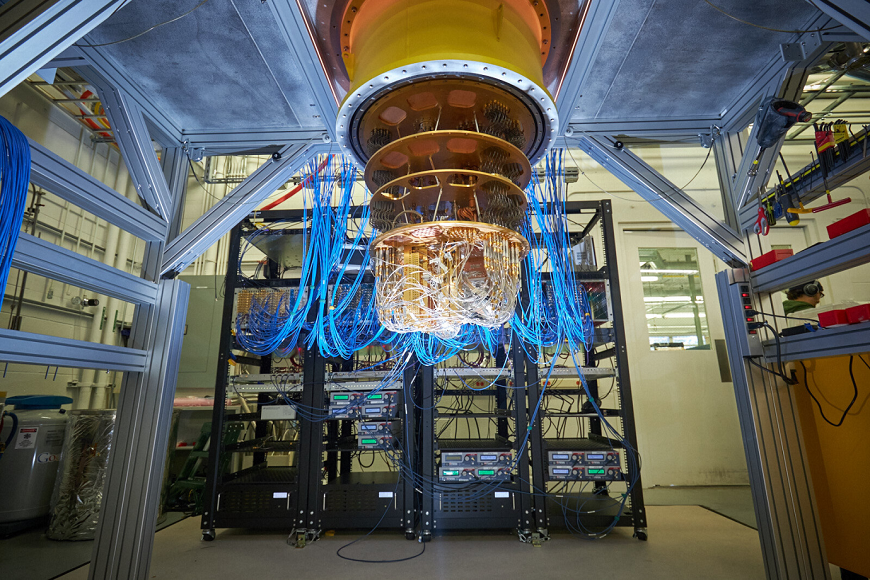
It is expected that Quantum computers will increase the computational power, which means a computation that can take at least a year to get solved when solved with a normal computer system can be solved by a quantum computer in just a few seconds. This is the power of quantum computing. In some big brands such as Google, a quantum computer has been successfully developed as well as experimented with. Although it is an immensely powerful computer system, the structure and method of using are too complicated. Thus, a non-technical person will not be able to operate it and understand it. Currently, it is being used by researchers and scientists only. Still, the work is under process so as to build a very fascinating and powerful computer system for the upcoming era. The research is being carried on such computers because it is a very optimized, complicated, and one of the fastest computer system until now. Challenges are still occurring that can become barriers in the future, and so more work is to be done on making the Quantum computer at its best version. Here, we will discuss the working process of a Quantum computer system and its essential concepts that should be well understood to know the working of the Quantum computers. Introduction to Quantum ComputersBefore knowing the working of a Quantum computer, one should have a brief introduction to Quantum systems. A Quantum Computer is a computer system or a device that is used for calculating complex problems that a normal computer system cannot handle or may take a hundred years to solve the problem. The Quantum Computer follows the Quantum theory of Physics. The Quantum theory of Physics describes nature to its depth. Such property enables a Quantum computer to work and deal with complex problems. Till now, we have learned and understood about a computer that it understands data in the form of two binary bits (0 and 1). It is the same in the case of a quantum computer, but a quantum computer takes input in the form of Qubits (either 0 or 1). It means it takes only one value as input. As a result, in a classical computer system, bits are the smallest unit, whereas, in a quantum computer, Qubits is the smallest unit of data processing. Such a difference makes the nature and behavior of a Quantum computer more complex. Concepts of Quantum ComputerA Quantum computer relies on the concept of Quantum Computing, which is further based on Quantum Information Science. Basically, there are the following fundamentals that should be kept in mind while discussing about Quantum Computer Concepts of Quantum Computer. Therefore, there are the following essential phenomenons about Quantum Computer: 1) Qubits: Also known as Quantum Bits. As discussed above that these qubits are the storage units and data representation units in a quantum computer. In a traditional computer, it uses bits to store and represent the data in the form of 0 and 1. In Quantum computers, data is represented either in the form of 0 or 1 or both simultaneously. Also, Qubits varies from bits because Qubits can remain in an intermediate state until it is not readout. Qubits have the probability of being 0 and being 1 unless it is measured. These Quantum bits are used for representing atoms, ions, photons, or electrons with their associated control devices that process and work together to act as the computer processor or computer memory. 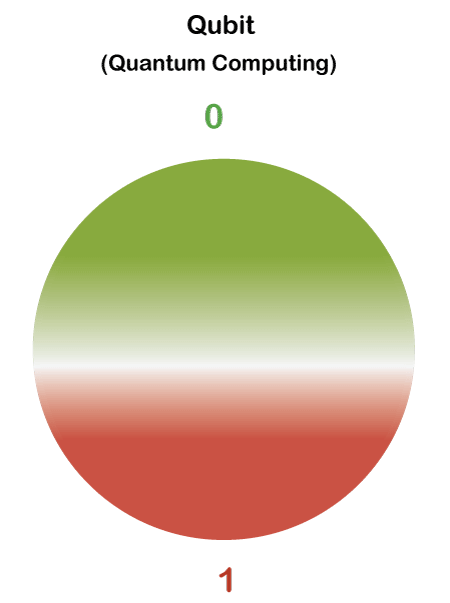
2) Superposition: The data provided by the user is encoded in the form of Quantum bits in a Quantum computer where these Qubits inherits the parallelism property. Due to such parallelism property, the Quantum systems are able to compute millions of computations in just one attempt. 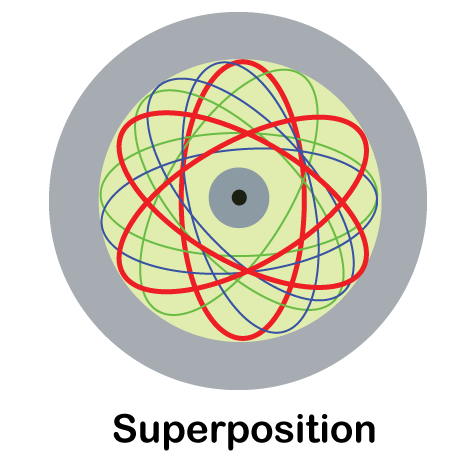
The concept of Superposition is the simultaneous positioning of the Qubits. It means that the Qubits (0 and 1) are the two sides of a coin, and when spinning the coin, either of the outcomes is positioned. It can be 0 or 1. A Qubit default state is 0, which means it begins from 0 and changes as got measured. 3) Entanglement: In quantum physics, there is a concept of Entanglement without which the Qubits and Superposition are not powerful enough. The actual magic of Quantum computers begins from Entanglement only. The word 'Entanglement' describes that distance doesn't matter for the Quantum Bits. It means the bond between the Qubits is highly strong that these Qubits affect each other even placed at a far distance from one another. Such an aspect of Quantum physics is known as 'Spooky action at a distance' said by Albert Einstein. These Quantum bits are dependent on one another. 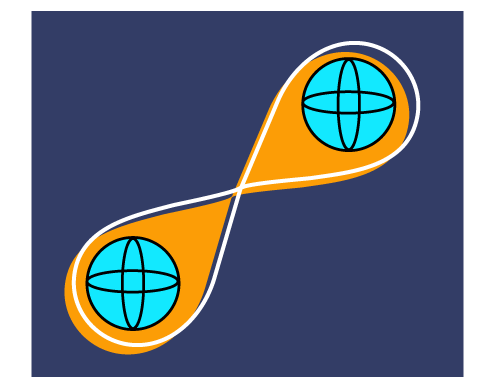
According to Entanglement, when increasing the number of Qubits, the number of those correlations grows in an exponential manner. For example, there are 2ncorrelations for n number of Qubits. It makes it possible for the Quantum Computer to solve highly complex problems that can just be a hope for a classical computer. Thus, these three aspects of Quantum Physics make the power of a Quantum Computer. Three of them complete the working of the Quantum Computer. Working Of Quantum ComputersThe data representation unit is Qubits for a Quantum system. The system performs computations by determining the probability of the state of the object before measuring it. These Qubits are superpositioned as well as entangled. In order to make functional qubits, these systems should be cooled near to absolute zero. In case, Qubits are supercooled, and they do not maintain their coherence (entangled state) for a long period. This is the reason behind the creation of extra tricky programming. Thus, for programming the Quantum systems, different kinds of logic gates are used in a sequential manner. However, these programs need to be executed too fast that the coherence state of the quantum bits remains maintained until measured. The state of Qubit can be represented by the three-axis x, y, and z, where the state is a combination of the values along these three axes, i.e., the Superposition. 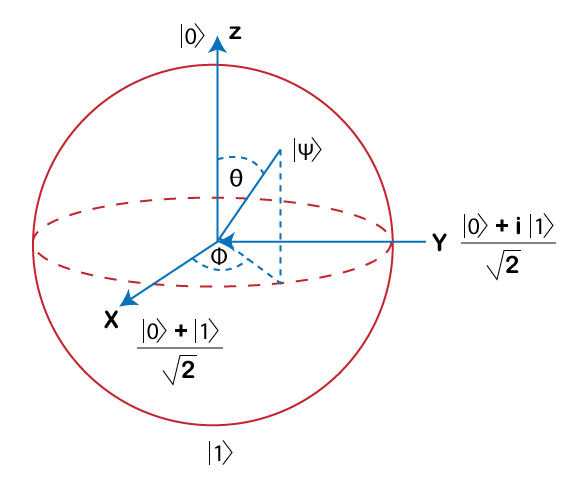
Thus, the probability of an event occurring of 1 or 0 changes when the Qubits are in Superposition. Once a Qubit is read in any state, it loses the information regarding the other state. For example, if the Qubit's state is read as 0, then it will lose all the information regarding the state as 1. It is already known that the starting state of a qubit is 0. Later, using the Hadamard gate (a type of logic gate), it is moved to an intermediate state due to which the value of the Qubit's state is read as 0 for half of the time, and then it is read as 1 for the other half time. Other logic gates are used for flipping the Qubits state in different directions with different amounts on the three axes. There are three where two axes are 0 and 1, and the third axis represents the phase and also provides some extra possibilities in order to represent the information. You can see in the below-given figure to understand the working of the Qubit state. But, the power of Qubits and Superposition is incomplete without Entanglement as this concept makes multiple large potential gains as:
In the case of programming, quantum computers with Entanglement begin via a c-NOT logic gate that is typically programmed and used for flipping the state of an entangled particle if its partner value is read out as 1, but it only performs when measured. Types of Quantum ComputersThere are the following types of Quantum Computers, and these types were made possible by IBM: Quantum AnnealerIt is the type which is having the least power as compared with the other two types of Quantum computers. However, it is the simplest type to be built, which is capable of performing only one specific function. The system has been developed by D-Wave 9 (a Canadian company), but it is not sure that it obtain any real quantumness. In December 2015, Google also appreciated the D-Wave quantum system after testing it and said that D-Wave systems, when tested, was 3600 times faster to solve a problem than a supercomputer. Still, the advantages of the Quantum Annealer are not proved against a conventional computer. Analog QuantumIt is more powerful than the Annealer system, which is/ will be able to simulate complex quantum interactions that can interact with any conventional system. It is also expected that the Analog Quantum system will be capable of holding 50 to 100 Qubits. Universal QuantumIt is the most powerful type of quantum computer among the three. As it is the most powerful means the hardest to build. The work to build a strong and powerful enough system is under process and in progress. Thus, it needs to tackle certain difficult challenges. As per the current situation, the universal quantum computer will be capable of holding 100, 000 physical Qubits. The Universal Quantum is exponentially faster than a normal classical computer. But, it needs to face and possess various challenges. The system uses quantum mechanics for processing huge amounts of data and computes them in the most powerful ways. Thus, the future of the Quantum computer is too bright and will definitely grow the market massively. It will become capable of coordinating and working with AI, cryptography, robotics, pharmaceuticals, as well as defense. The market of Quantum computers can reach trillion dollars but is expected when the Universal Quantum will launch in the market. Yet, the work and progress are being carried in the field of Quantum Computers, and it is expected that it will trend the world in the upcoming five years.
Next TopicHow to clean Computer
|
 For Videos Join Our Youtube Channel: Join Now
For Videos Join Our Youtube Channel: Join Now
Feedback
- Send your Feedback to [email protected]
Help Others, Please Share









